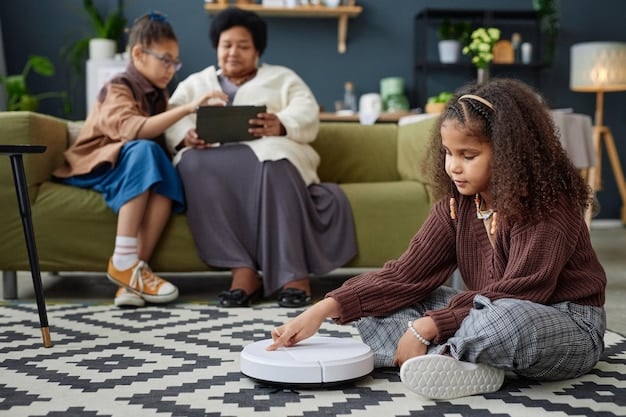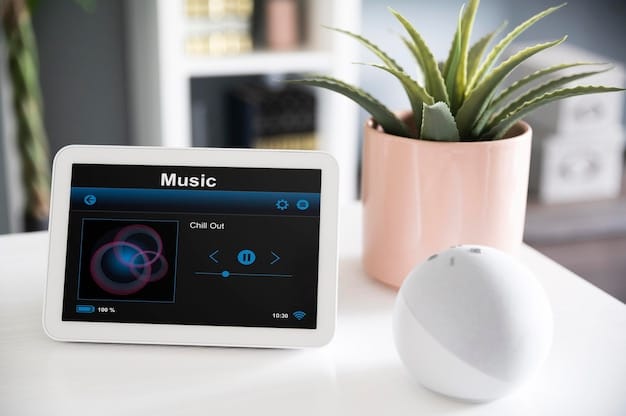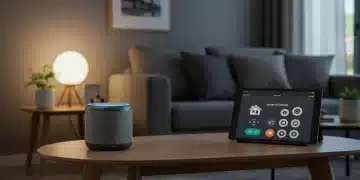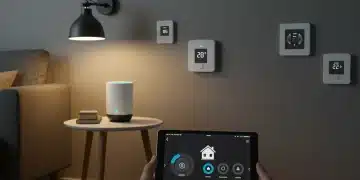Voice Control Showdown: Choosing the Right Smart Assistant in 2025

In 2025, the smart home landscape will be dominated by sophisticated voice assistants; the choice between options like Amazon Alexa, Google Assistant, and Apple’s Siri depends on individual needs, privacy concerns, ecosystem preferences, and how well they integrate with existing smart devices.
The future of home automation hinges on seamless voice control, but navigating the choices can be overwhelming. Let’s explore the Voice Control Showdown: Which Smart Assistant is Right for Your Home in 2025?, weighing the pros and cons to help you make the best decision.
Smart Home Evolution: Voice Control Takes Center Stage
Voice control is no longer a novelty; it’s becoming the primary interface for interacting with our homes. Understanding the trajectory of smart home technology is crucial to appreciating the role of voice assistants.
Advancements in AI, machine learning, and natural language processing are driving this evolution. By 2025, voice assistants will be even more intuitive, responsive, and integrated with our daily routines.
The Rising Importance of Smart Home Ecosystems
Smart home ecosystems have evolved to offer interconnected devices that work seamlessly together, creating a cohesive and convenient smart home experience.
- Unified Control: Managing multiple devices through a single voice command streamlines tasks and enhances usability.
- Automated Routines: Triggering a series of actions with a single phrase simplifies complex processes, such as setting the mood for a movie night.
- Data Integration: Sharing data across devices enables more personalized and responsive automation, optimizing energy use and enhancing security.
The growing emphasis on interoperability and standardization will make it easier to integrate devices from different manufacturers, creating more open and flexible ecosystems.

Alexa, Google, or Siri: A Head-to-Head Comparison
Each voice assistant has its strengths and weaknesses. Evaluating them based on key criteria is essential for making an informed decision.
This comparison will cover areas such as device compatibility, voice recognition accuracy, privacy features, and integration with other services.
Amazon Alexa: The Versatile Integrator
Amazon Alexa boasts extensive device compatibility and works with a vast range of smart home products. Its strength lies in its ability to integrate diverse devices into a unified ecosystem.
Alexa’s skills marketplace enhances functionality by allowing users to add personalized voice commands and features from third-party developers.
Google Assistant: The Knowledge Powerhouse
Google Assistant leverages Google’s extensive knowledge graph to provide accurate and contextually relevant information. Its natural language processing capabilities are among the best in the industry.
Google Assistant seamlessly integrates with other Google services, such as Gmail, Calendar, and Maps, offering a connected experience for users.
Apple Siri: The Privacy-Focused Assistant
Apple Siri prioritizes user privacy and focuses on secure data handling. Its tight integration with the Apple ecosystem provides a seamless experience for Apple users.
Siri emphasizes simplicity and ease of use, making it accessible to users who may be less tech-savvy or concerned about data security.
Ultimately, the choice between Alexa, Google Assistant, and Siri depends on individual preferences, the existing ecosystem you are invested in, and the importance of privacy.
Evaluating Device Compatibility and Ecosystem Integration
Device compatibility and integration with existing smart home ecosystems are vital factors in choosing a voice assistant.
Ensuring that your preferred assistant integrates with a wide range of devices will give you the flexibility to expand your smart home network in the future.
Alexa’s Dominance in Device Compatibility
Amazon Alexa has the broadest device compatibility, supporting numerous smart home devices from various manufacturers. This versatility makes it an excellent choice for those who want flexibility in their smart home setup.
- Extensive Device Support: Works with thousands of devices, from smart lights and thermostats to security cameras and kitchen appliances.
- Simplified Setup: Streamlines device setup with hassle-free integration, allowing users to quickly connect new devices.
- Enhanced Interoperability: Supports multiple communication protocols, ensuring seamless interaction between different devices.
Alexa can easily integrate and control various smart devices. Alexa’s broad compatibility makes it accessible for any smart home enthusiast looking to expand their home.
Google Assistant’s Seamless Google Service Integration
Google Assistant seamlessly integrates with Google’s suite of services, including Gmail, Google Calendar, and Google Maps. This integration provides a unified user experience for Google users.
- Calendar and Email Integration: Provides up-to-date event reminders and email summaries, keeping users organized and informed.
- Navigation and Location Services: Offers real-time traffic updates and location-based reminders, ensuring users are always on time.
- Personalized Recommendations: Provides relevant news and information based on user preferences, enhancing the overall Google Assistant experience.
Google Assistant’s integration with the Google services ensures a smooth transition and a highly tailored user experience.

Privacy and Security Considerations
Privacy is a paramount concern when choosing a voice assistant. Understanding the data collection practices and security measures of each provider is crucial.
This section will explore the privacy policies of Amazon, Google, and Apple, and offer practical steps to protect your personal information.
Understanding Data Collection Practices
Each voice assistant collects data to improve its performance and personalize user experiences. It’s important to understand what data is collected and how it’s used.
Amazon collects data through Alexa interactions, purchase history, and browsing activity. Google collects data through Google Assistant interactions, search history, and location data. Apple collects data through Siri interactions, device usage, and iCloud data.
Users should regularly review their privacy settings within each platform to manage data collection preferences.
Implementing Security Measures
Taking proactive steps to secure your voice assistant and smart home devices can minimize the risk of unauthorized access and data breaches.
- Enable Two-Factor Authentication: Adds an extra layer of security to your accounts, preventing unauthorized access.
- Regularly Update Firmware: Ensures devices are protected against the latest security vulnerabilities.
- Use Strong Passwords: Create unique and complex passwords for each of your accounts.
By implementing security measures, you can reduce the risk and protect your data.
Future Trends: What to Expect in 2025
Looking ahead to 2025, voice assistants will continue to evolve, incorporating advanced technologies and enhanced capabilities. Staying informed about these trends is essential for making future-proof decisions.
Developments in AI, edge computing, and personalized voice experiences will shape the landscape of voice control.
Advancements in AI and Natural Language Processing
AI and natural language processing (NLP) are driving significant advancements in voice assistant technology. These improvements will enhance accuracy, context understanding, and personalized interactions.
Voice assistants will become more adept at understanding complex requests, interpreting nuanced language, and responding in a natural and conversational manner.
This will allow for personalized interactions between you and your assistant while executing tasks.
The Role of Edge Computing in Voice Processing
Edge computing will play an increasingly important role in voice processing by moving computational tasks from the cloud to local devices. This shift reduces latency, improves responsiveness, and enhances privacy.
Edge computing enables voice assistants to process commands locally, reducing the need to send data to remote servers for processing.
This results in faster response times and enhanced privacy, as data is processed on the device rather than being transmitted over the internet.
Making the Right Choice for Your Smart Home
Choosing the right voice assistant for your smart home in 2025 requires careful consideration of your individual needs, priorities, and existing technology ecosystem.
Evaluating the strengths and weaknesses of Alexa, Google Assistant, and Siri, as well as forthcoming tech innovations will help you make an informed decision.
Consider Your Existing Tech Ecosystem
Consider your existing tech ecosystem when choosing a voice assistant. Integration with your current devices and services can streamline your smart home experience.
If you are heavily invested in the Amazon ecosystem, Alexa may be the best choice. If you rely on Google services, Google Assistant may be the more suitable option. If you prefer Apple devices, Siri might be the most seamless integration.
Ultimately, the best decision is to prioritize your existing ecosystem!
Prioritize Your Needs and Priorities
Consider convenience, advanced functionality and the privacy policies when choosing a voice assistant. Aligning your choice with your tech demands and priorities ensures satisfaction.
If convenience and versatility are important, Alexa may be the best choice. If you prioritize knowledge and search capabilities, Google Assistant may be more appealing. If privacy is a primary concern, Siri may offer greater peace of mind.
Always go with your gut feeling when it comes to features and prioritizing your needs.
| Key Feature | Brief Description |
|---|---|
| 💡 Device Compatibility | Alexa supports numerous smart home devices, providing versatility and flexibility. |
| 🌐 Service Integration | Google Assistant integrates with Gmail, Calendar, and Maps for a connected experience. |
| 🔒 Privacy Focus | Siri emphasizes user data privacy with secure data handling. |
| 🚀 Future Trends | Expect AI advancements, edge computing, and personalized voice experiences. |
Frequently Asked Questions
▼
Amazon Alexa generally provides the broadest compatibility, working with a wide range of devices from various manufacturers, making it a versatile choice for comprehensive smart home integration.
▼
To protect your privacy, review and adjust privacy settings, enable two-factor authentication, regularly update device firmware, and use strong, unique passwords for your accounts.
▼
Consider advancements in AI and NLP, the role of edge computing for faster processing, and increasing personalization for a more intuitive smart home experience.
▼
Google Assistant is ideal as it seamlessly integrates with Gmail, Calendar, and Maps, providing a cohesive and efficient experience for users within the Google ecosystem.
▼
Ease of use is critical, especially for users new to smart home technology. A user-friendly interface ensures effortless setup and operation, enhancing overall satisfaction and adoption.
Conclusion
In conclusion, choosing the right voice assistant for your home requires a comprehensive assessment. Prioritize your specific needs, ecosystem preferences, and privacy concerns to make the best choice for your smart home experience in 2025.





